Unit 6 TV programmes Grammar课件(共19张PPT)
文档属性
| 名称 | Unit 6 TV programmes Grammar课件(共19张PPT) | 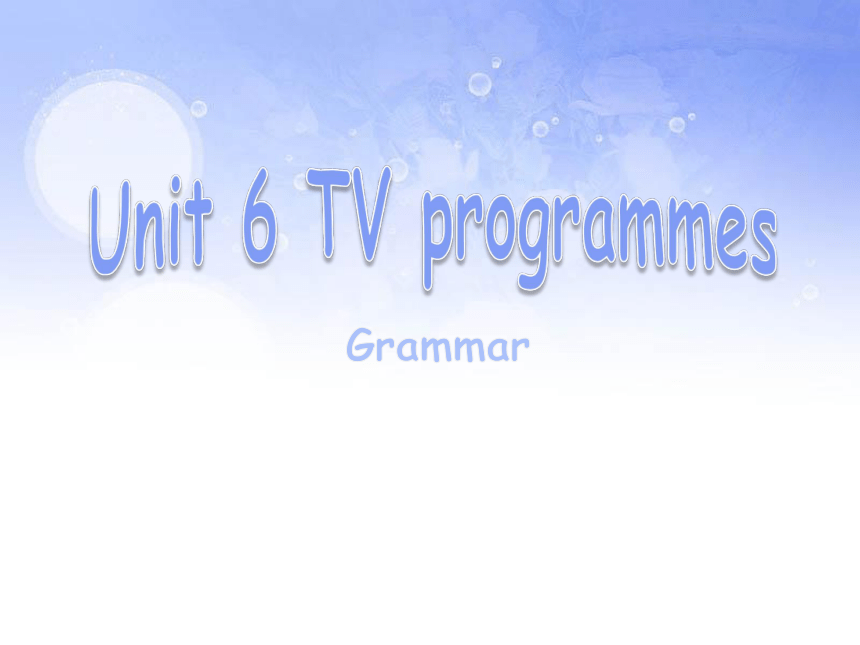 | |
| 格式 | zip | ||
| 文件大小 | 827.7KB | ||
| 资源类型 | 教案 | ||
| 版本资源 | 牛津译林版 | ||
| 科目 | 英语 | ||
| 更新时间 | 2021-12-01 10:29:55 | ||
图片预览

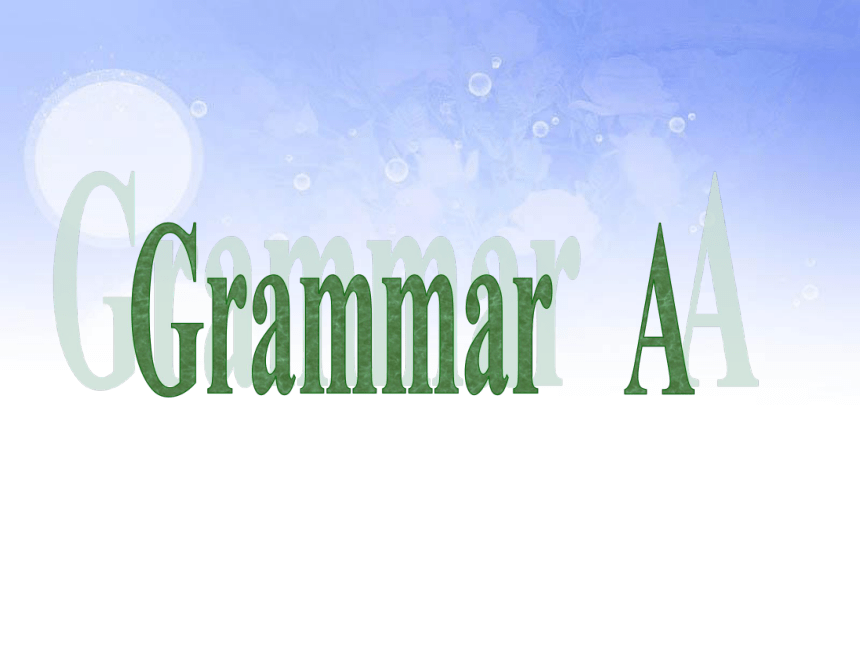
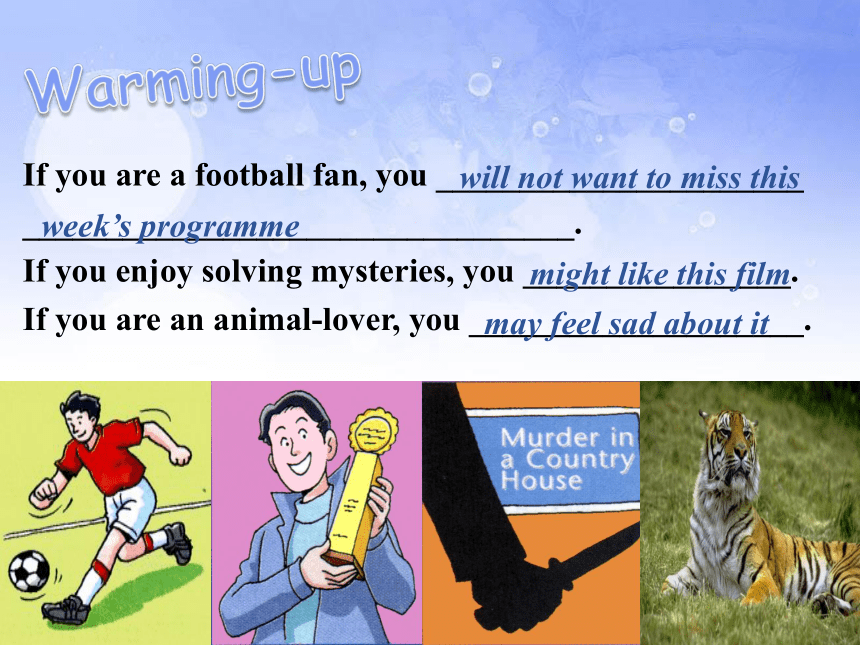
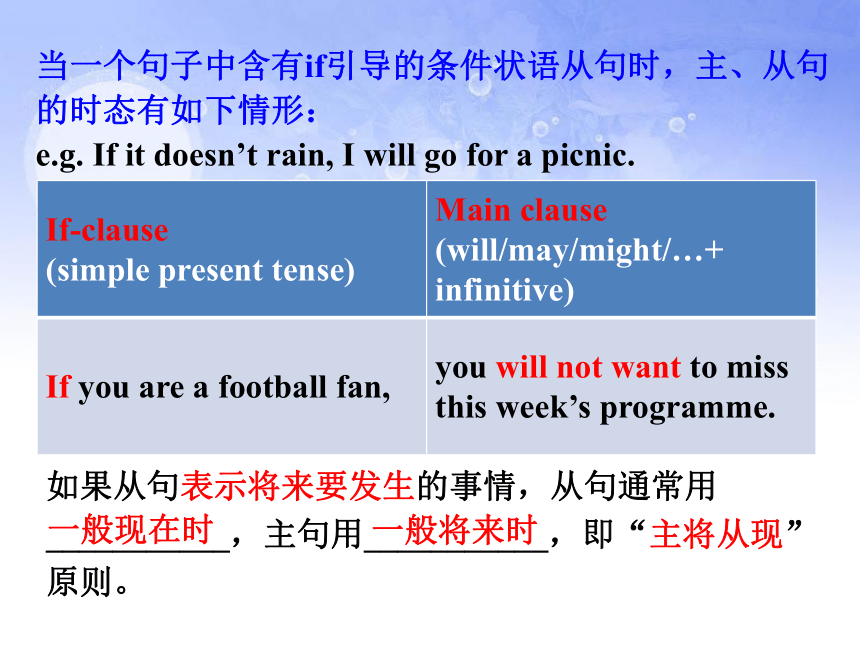
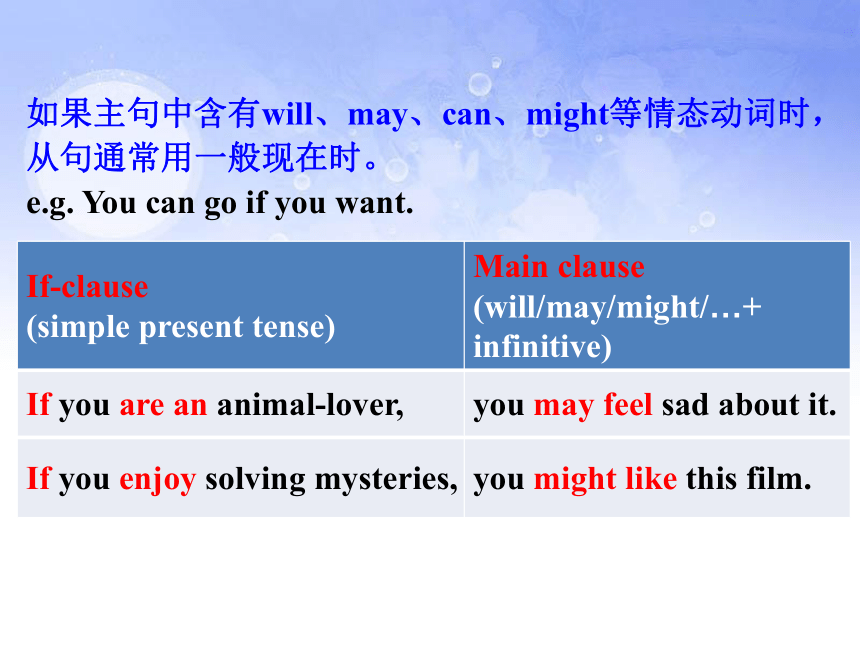
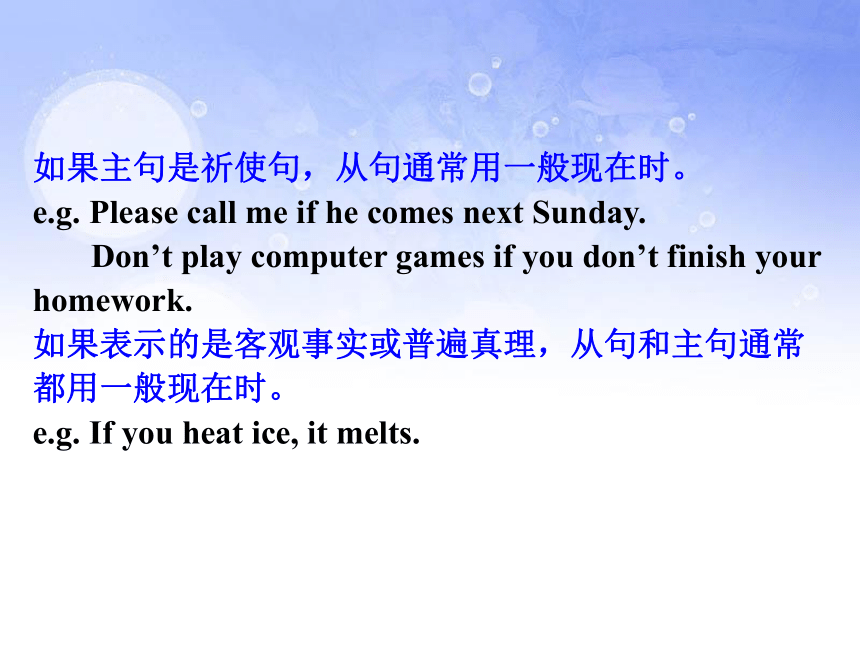
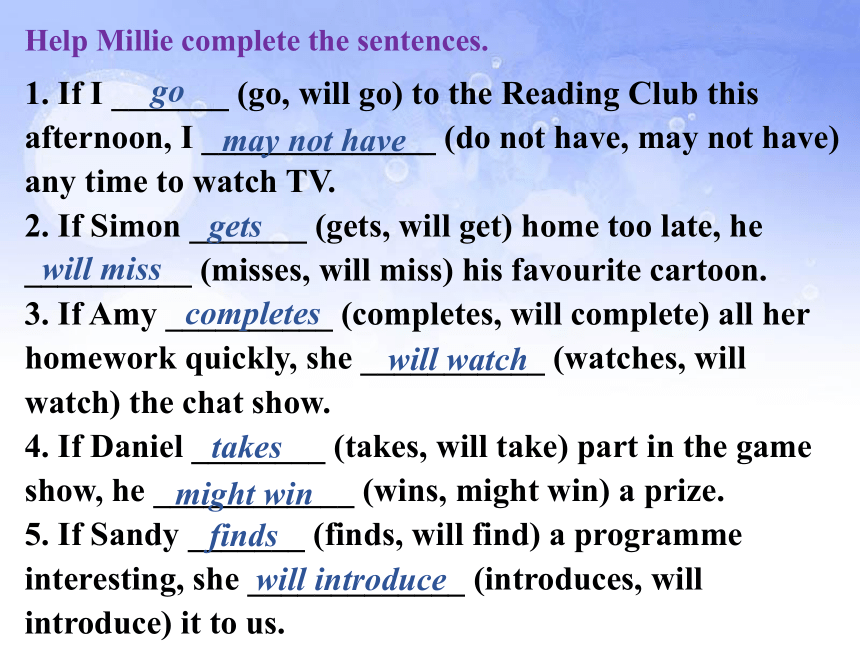
文档简介
(共19张PPT)
Unit 6 TV programmes
Grammar
Grammar A
Warming-up
If you are a football fan, you ______________________
_________________________________.
If you enjoy solving mysteries, you ________________.
If you are an animal-lover, you ____________________.
will not want to miss this week’s programme
might like this film
may feel sad about it
当一个句子中含有if引导的条件状语从句时,主、从句的时态有如下情形:
e.g. If it doesn’t rain, I will go for a picnic.
If-clause (simple present tense) Main clause
(will/may/might/…+
infinitive)
If you are a football fan, you will not want to miss this week’s programme.
如果从句表示将来要发生的事情,从句通常用___________,主句用___________,即“主将从现”原则。
一般现在时
一般将来时
如果主句中含有will、may、can、might等情态动词时,从句通常用一般现在时。
e.g. You can go if you want.
If-clause (simple present tense) Main clause
(will/may/might/…+
infinitive)
If you are an animal-lover, you may feel sad about it.
If you enjoy solving mysteries, you might like this film.
如果主句是祈使句,从句通常用一般现在时。
e.g. Please call me if he comes next Sunday.
Don’t play computer games if you don’t finish your homework.
如果表示的是客观事实或普遍真理,从句和主句通常都用一般现在时。
e.g. If you heat ice, it melts.
Help Millie complete the sentences.
If I _______ (go, will go) to the Reading Club this afternoon, I ______________ (do not have, may not have) any time to watch TV.
2. If Simon _______ (gets, will get) home too late, he __________ (misses, will miss) his favourite cartoon.
3. If Amy __________ (completes, will complete) all her homework quickly, she ___________ (watches, will watch) the chat show.
4. If Daniel ________ (takes, will take) part in the game show, he ____________ (wins, might win) a prize.
5. If Sandy _______ (finds, will find) a programme interesting, she _____________ (introduces, will introduce) it to us.
go
may not have
gets
will miss
completes
will watch
takes
might win
finds
will introduce
We often use the simple __________ (future, present) tense in the if-clause. We need a _________ (comma, full stop) after the if-clause when it is the first part of a sentence.
present
comma
Work out the rule!
Millie watched a documentary about animals. Help Millie answer her father’s questions with the help of the words in the box.
attack catch hunt live protect walk
Dad: What will a bear do if it’s in danger
Millie: If a bear (1)__________, it (2)_________ people.
Dad: What will a polar bear do if it’s hungry
Millie: If a polar bear (3)___________, it (4) _________ fish from the water.
Dad: What will elephants do if they’re thirsty
Millie: If elephants (5)__________, they (6)________ until they find a river.
is in danger
will attack
is hungry
will catch
are thirsty
will walk
Dad: What will tigers do if they live in the wild
Millie: Tigers (7)__________ for their own food if they
(8)______________.
Dad: What will tigers do if they have babies
Millie: Tigers (9)_________ as a family if they (10)____________.
Dad: What will male wolves do if there’s danger
Millie: Male wolves (11)____________ their families if there (12)___________.
will hunt
live in the wild
will live
have babies
will protect
is danger
Grammar B
unless意为“除非,如果不”,可用来引导条件状语从句。unless引导的从句既可以放在主句之前也可以放在主句之后。当从句位于主句之前时,常用逗号与主句隔开。
e.g. He won’t come to the party unless you invite him.
如果主句是一般将来时态,则unless 引导的从句的时态通常用一般现在时表将来。Sometimes we can use if ... not to replace unless.
e.g. The situation will continue unless humans stop hunting them for their fur and bones.
= The situation will continue if humans do not stop hunting them for their fur and bones.
The unless-clause can come first or after the main clause.
e.g. Unless you try your best, you will not realize your dream.
You will be late unless you leave right now.
在unless引导的条件状语从句中,主句也可以含有情态动词或祈使句。
e.g. He cannot see clearly unless he wears glasses.
Don’t touch the machine unless the teacher allows you to.
1. Unless the weather report
says it is going to rain,
2. We will arrive at the
studio around 9:30 a.m.,
3. Unless you already know
the studio very well,
4. You will buy your lunch at
the restaurants in the
studio,
5. Unless you are tired,
6. You will have a chance to
see how a TV programme
is recorded,
a. unless you take your
own food with you.
b. you will not need to
take the minibus in the
studio.
you will not have to take
an umbrella with you.
unless the traffic is very
heavy.
unless you have little
interest in it.
you will travel around it
with a tour guide.
Help Sandy match the two parts of the sentences.
We use the simple__________ (future, present) tense in the unless-clause.
present
Work out the rule!
Useful phrases and expressions
1. introduce sth. to sb. 向某人介绍某物
2. be in danger 处于危险之中
3. live in the wild 住在野外
4. live as a family 以家庭的形式生活
5. have a chance to do sth. 有机会做某事
6. take your own food with you 随身带着你自己的食物
7. have little interest in… 对……几乎没有兴趣
Exercises
1. If there ________ no buying and selling of animals, there _______ no killing in nature.
A. is; will be B. will be; will be
C. is; is D. will be; is
2. If he comes late, ______ he will miss the train.
A. and B. so C. / D. or
3. Mary will go to Sanya if she _______ a five-day trip.
A. have B. had C. will have D. has
4. I don’t know _____ he will come tomorrow. _____ he comes, I’ll tell you.
A. if; Whether B. whether; Whether
C. if; That D. if; If
5. ---Look, what have you done
---Sorry. I think if I ________ another chance, I’ll do it better.
A. give B. will be given
C. will give D. am given
6. ---May I surf the Internet now
---No, _______ you have finished doing the dishes.
A. unless B. if C. because D. when
7. Millie says she won’t take part in Julie’s birthday party_______ she’s invited.
A. unless B. after C. because D. if
8. He asked me ________ we could go to Beijing to watch the game by plane.
A. that B. if C. how D. what
Thank you!
Unit 6 TV programmes
Grammar
Grammar A
Warming-up
If you are a football fan, you ______________________
_________________________________.
If you enjoy solving mysteries, you ________________.
If you are an animal-lover, you ____________________.
will not want to miss this week’s programme
might like this film
may feel sad about it
当一个句子中含有if引导的条件状语从句时,主、从句的时态有如下情形:
e.g. If it doesn’t rain, I will go for a picnic.
If-clause (simple present tense) Main clause
(will/may/might/…+
infinitive)
If you are a football fan, you will not want to miss this week’s programme.
如果从句表示将来要发生的事情,从句通常用___________,主句用___________,即“主将从现”原则。
一般现在时
一般将来时
如果主句中含有will、may、can、might等情态动词时,从句通常用一般现在时。
e.g. You can go if you want.
If-clause (simple present tense) Main clause
(will/may/might/…+
infinitive)
If you are an animal-lover, you may feel sad about it.
If you enjoy solving mysteries, you might like this film.
如果主句是祈使句,从句通常用一般现在时。
e.g. Please call me if he comes next Sunday.
Don’t play computer games if you don’t finish your homework.
如果表示的是客观事实或普遍真理,从句和主句通常都用一般现在时。
e.g. If you heat ice, it melts.
Help Millie complete the sentences.
If I _______ (go, will go) to the Reading Club this afternoon, I ______________ (do not have, may not have) any time to watch TV.
2. If Simon _______ (gets, will get) home too late, he __________ (misses, will miss) his favourite cartoon.
3. If Amy __________ (completes, will complete) all her homework quickly, she ___________ (watches, will watch) the chat show.
4. If Daniel ________ (takes, will take) part in the game show, he ____________ (wins, might win) a prize.
5. If Sandy _______ (finds, will find) a programme interesting, she _____________ (introduces, will introduce) it to us.
go
may not have
gets
will miss
completes
will watch
takes
might win
finds
will introduce
We often use the simple __________ (future, present) tense in the if-clause. We need a _________ (comma, full stop) after the if-clause when it is the first part of a sentence.
present
comma
Work out the rule!
Millie watched a documentary about animals. Help Millie answer her father’s questions with the help of the words in the box.
attack catch hunt live protect walk
Dad: What will a bear do if it’s in danger
Millie: If a bear (1)__________, it (2)_________ people.
Dad: What will a polar bear do if it’s hungry
Millie: If a polar bear (3)___________, it (4) _________ fish from the water.
Dad: What will elephants do if they’re thirsty
Millie: If elephants (5)__________, they (6)________ until they find a river.
is in danger
will attack
is hungry
will catch
are thirsty
will walk
Dad: What will tigers do if they live in the wild
Millie: Tigers (7)__________ for their own food if they
(8)______________.
Dad: What will tigers do if they have babies
Millie: Tigers (9)_________ as a family if they (10)____________.
Dad: What will male wolves do if there’s danger
Millie: Male wolves (11)____________ their families if there (12)___________.
will hunt
live in the wild
will live
have babies
will protect
is danger
Grammar B
unless意为“除非,如果不”,可用来引导条件状语从句。unless引导的从句既可以放在主句之前也可以放在主句之后。当从句位于主句之前时,常用逗号与主句隔开。
e.g. He won’t come to the party unless you invite him.
如果主句是一般将来时态,则unless 引导的从句的时态通常用一般现在时表将来。Sometimes we can use if ... not to replace unless.
e.g. The situation will continue unless humans stop hunting them for their fur and bones.
= The situation will continue if humans do not stop hunting them for their fur and bones.
The unless-clause can come first or after the main clause.
e.g. Unless you try your best, you will not realize your dream.
You will be late unless you leave right now.
在unless引导的条件状语从句中,主句也可以含有情态动词或祈使句。
e.g. He cannot see clearly unless he wears glasses.
Don’t touch the machine unless the teacher allows you to.
1. Unless the weather report
says it is going to rain,
2. We will arrive at the
studio around 9:30 a.m.,
3. Unless you already know
the studio very well,
4. You will buy your lunch at
the restaurants in the
studio,
5. Unless you are tired,
6. You will have a chance to
see how a TV programme
is recorded,
a. unless you take your
own food with you.
b. you will not need to
take the minibus in the
studio.
you will not have to take
an umbrella with you.
unless the traffic is very
heavy.
unless you have little
interest in it.
you will travel around it
with a tour guide.
Help Sandy match the two parts of the sentences.
We use the simple__________ (future, present) tense in the unless-clause.
present
Work out the rule!
Useful phrases and expressions
1. introduce sth. to sb. 向某人介绍某物
2. be in danger 处于危险之中
3. live in the wild 住在野外
4. live as a family 以家庭的形式生活
5. have a chance to do sth. 有机会做某事
6. take your own food with you 随身带着你自己的食物
7. have little interest in… 对……几乎没有兴趣
Exercises
1. If there ________ no buying and selling of animals, there _______ no killing in nature.
A. is; will be B. will be; will be
C. is; is D. will be; is
2. If he comes late, ______ he will miss the train.
A. and B. so C. / D. or
3. Mary will go to Sanya if she _______ a five-day trip.
A. have B. had C. will have D. has
4. I don’t know _____ he will come tomorrow. _____ he comes, I’ll tell you.
A. if; Whether B. whether; Whether
C. if; That D. if; If
5. ---Look, what have you done
---Sorry. I think if I ________ another chance, I’ll do it better.
A. give B. will be given
C. will give D. am given
6. ---May I surf the Internet now
---No, _______ you have finished doing the dishes.
A. unless B. if C. because D. when
7. Millie says she won’t take part in Julie’s birthday party_______ she’s invited.
A. unless B. after C. because D. if
8. He asked me ________ we could go to Beijing to watch the game by plane.
A. that B. if C. how D. what
Thank you!
